
Hyperthyroidism in Cats
Hyperthyroidism is the most common endocrinopathy (hormonal disease) of cats. It mainly happens in older kitties (usually greater than 10 years of age).
Hyperthyroidism means excessive thyroid activity. It causes a sustained high metabolic state produced by thyroid nodules secreting too much thyroid hormone. 98% of these nodules are benign, but this very high metabolic rate causes symptoms.
- The most typical scenario is a cat that is losing weight despite good appetite.
- Another common finding on physical exam is a very rapid heart rate with the presence of a heart murmur.
- Other signs may include intermittent vomiting, increased drinking, diarrhea, behaviour change and poor hair coat.
Diagnosis is made via a blood test which shows elevated thyroid level.
The 3 most common ways that we can treat hyperthyroidism include:
- Methimazole – a medication which blocks the pathway that leads to the formation of thyroid hormone. This medication comes in the form of a tablet or a transdermal gel that is applied to the inner part of the ear.
- Y/D Diet – is a special diet from Hill’s. It is an iodine-deficient diet that is effective in lowering thyroid hormone levels. This diet is only suitable for indoor cats, and the diet must be very strictly adhered to.
- Radioactive Iodine Injection – this is a potential cure for hyperthyroid cats but does require a 1 week stay at a referral clinic in Victoria or in the Lower Mainland. The radioactive iodine is absorbed into and destroys the problematic thyroid tissue. It is curative in 98 – 99% of cats.

Recent Comments